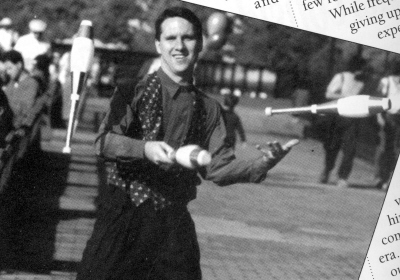 |
Page 19 Summer 1993
|
Although
he has worked hard perfecting seven balls and five clubs, Duncan
pursues three ball variations with unflagging creativity, and his supply
of unusual tricks seems inexhaustible. During a visit to Philadelphia
last year - his first convention in
nine years - he demonstrated many of these with his eyes closed.
"For
me, the process of inventing tricks is completely internal. I think
about how it feels, rather than how it looks from the outside."
This process of learning is what fascinates Duncan most about
juggling. In college at Rochester, he switched his major from
astrophysics to evolutionary
biology, subjects that encouraged logical
thinking and may have influenced his analytical approach to juggling.
"I find it amazing that a year ago I couldn't do this, and now I
can," he frequently observes. "There's just so much that
goes into really mastering something, and then being able to do it in
performance. Why it doesn't work every time once you know it is a
mystery to me."
Duncan
shares a point in common with the 1992 Silver Medallist Miguel
Herrera: Duncan's parents lived in Cuba when he was born, and he spent
his early childhood there. The family also lived in Mexico and Brazil.
Since his days as a longhaired juggler's juggler practicing in the
park and teaching classes to help pay for a loft, Duncan's image as a
performer has changed somewhat. But his passion for learning new
skills and his willingness to teach and encourage others have not.
While
Duncan has successfully made the transition from his days as a street
juggler to a blossoming career aboard cruise ships and in theatrical
shows, his long-time collaborator Jaki Reis has become an innovative
and polished partner in the act. Together the two have a more outgoing
rapport with the audience, and they have evolved some unconventional
duet techniques which require precise timing and illustrate their
cooperative coordination.
One
of their first jobs as a duet was in the touring company of the
Broadway show "Sugar Babies," a situation they considered ideal
because the audience was already enjoying the show and was in a
receptive mood for their act. Jaki's interest in juggling began when
the two shared a small room in Japan while performing at the Hiroshima
EXPO, and whoever was practicing got the most space. She admits that
it is "sometimes a bit discouraging practicing with someone who
does all the tricks you are trying to learn with his eyes
closed!" Duncan
attributes their success on stage to their lack of pretension and
evident enjoyment of what they do. He said, "People enjoy being
impressed more if they like you. I think Gatto is successful because
he has a good time and he shares that experience with the audience.
They appreciate difficult tricks even if they don't understand
them."
The
latest Duncan-Reis project is a collaboration with the "Quintet
of the Americas," a wind ensemble specializing in upbeat,
Latino music which combines well with a spirited style of juggling. At
a recent benefit performance for the Quintet, Tony and Jaki delighted
the audience with a new version of their six-ball duet, their
intricate exchanges perfectly executed despite the proximity of a
crystal chandelier. After the show they talked about an upcoming
cruise to South America and
While
frequent cruises sometimes mean giving
up other projects, they find the experience
a welcome "vacation from the
world," as Tony puts it. "A good ship is one
with room to practice, and finding a place to hang my slackrope is
always difficult - but when the
ship rocks, I'm the only one who
can stand up straight!"
While
Tony packs up, Jaki tosses various
items of increasing value to him
from (address book... whoosh. . . here comes
the tape recorder... why not.. .camera.
. . may as well). "This is how we unload our
groceries at home," says Jaki. "We're used
to it, but sometimes it makes people nervous." Soon everything is
packed except five brightly colored silicone balls, which
always seem to evade confinement.
They
linger in
Authors
Note: This seemed like a picture-perfect
ending at the time, but things
are never that simple in the juggling world. In
fact, the real story had just
begun! After an icy, penguin filled excursion to
Undaunted
by the experience, Tony and Jaki spent a few weeks recouping in New
York City and then headed out on another ship in early
May, this one bound for China. May they return
safely to tell the tale! |
 |